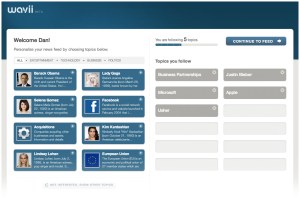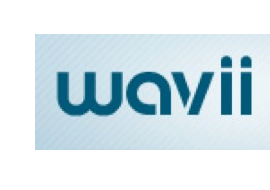After years, yes years, in various states of stealth mode, Seattle-based personalized news aggregation startup Wavii is finally launching to wide scale public consumption. Backed with a list of angel investors that reads like a who’s who of today’s tech industry — Ron Conway, Aydin Senkut, Mitch Kapor, Dave Morin, Shawn Fanning, Keith Rabois, Max Levchin, Paul Bucheit, Rick Marini, Joshua Schachter, and Mike Arrington’s CrunchFund to name just a few — Wavii is built upon some big ideas, and naturally is going to be greeted with some high expectations. Will it possibly be able to live up to them? In short: Maybe yes, maybe no.
But first let’s talk about what exactly it is.
Wavii provides a personalized feed of the news and current events that are relevant to you. The company likes to summarize what they do as “making Facebook out of Google.” You sign into the app, which is available on the web and on the iPhone app store, using Facebook connect. Based on the information gleaned from your profile there, Wavii will suggest topics or news providers that you should follow such as celebrities, publications, topics, companies, politicians and the like.
That’s when Wavii’s magic is meant to start. The app provides a feed, based on your interests, full of things that have happened recently that matter to you. And any one of the items presented within the Wavii news blurb can be clicked on to bring up more information about a certain person or topic.
Here Are The Good Parts
Seeing Wavii in action is really impressive. The app combs the increasingly huge world wide web to bring together truly relevant data, something that anyone who has used a major search engine to look for information on breaking news knows is a really hard problem to solve (so many duplicate articles, so much spam, so much garbage.)
Wavii has brought together a 25-person staff full of big data and machine learning experts, many of them alums from Amazon and Microsoft, and CEO Adrian Aoun tells me that the company has patents filed around the technology that makes its product possible. If you’ve ever tried to glean what you missed over the past few hours by scrolling through your Twitter stream, you’ll totally get how Wavii can be very useful. 
And Here Are The Iffy Parts
Will anyone really use it? As a reporter, I’d personally love it if people found more places to source their news. But the reality is, most of us have a collection of favorite websites — Twitter, Facebook, Google News and Google Reader, The New York Times, Techmeme, TechCrunch (wink wink), for example — and that’s where we get our information. Those established sites already have a huge advantage over any newcomer who tries to grab more attention. And it’s not like Wavii doesn’t have direct competition from similarly sized startups as well — Trap.it and Uberpaper are just the first that come to mind, and there are many more where those come from. Getting traction right now is going to be a tough battle.
Paying It Forward To The Open Web?
Another issue, and an admittedly more idealistic one, is that Wavii is not pitching back into the principles of the open web that made its own app possible in the first place. When I asked Aoun if the company was planning on making its personalized feeds available via RSS, his answer was non-committal — if the users demand it, Wavii will consider it, maybe. And what happens if all of Wavii’s top news sources decide to join the paywall bandwagon? “First of all, we don’t think that’s going to happen,” Aoun said. He’s almost certainly right, but when you’re thinking about building a long-term business — and gaining some good graces within the journalism community on top of which you’ve largely built your product — it could make sense to have a more thoughtful strategy.
In summary, make no mistake: Wavii’s smart engineering and executive leadership, savvy IP strategy, and bold-faced-name investors should make sure that it will not be forgotten in the tech startup scene. The news aggregation space may be too crowded — and Wavii’s approach may be too broad — for the company to gain any real traction. But this is a solid effort, and it certainly won’t be the last you hear from the company — or the very smart, and very plugged-in, people behind it.
